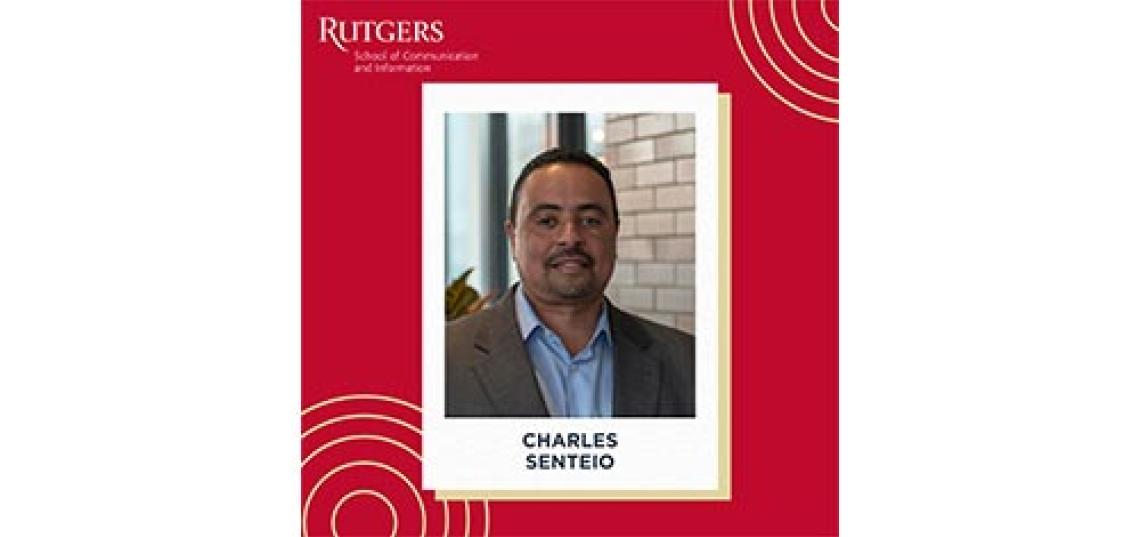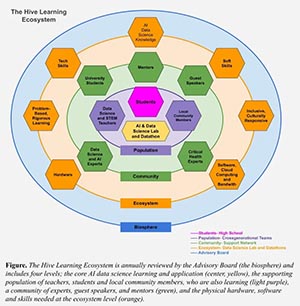
A new project providing up to 1,000 Rhode Island high school students, including minorities and young women from 12 Title 1 schools, with an opportunity to learn how AI and Machine Learning are impacting healthcare practices and outcomes for members of vulnerable populations has received funding from the National Science Foundation (NSF).
SC&I Associate Professor of Library and Information Science Charles Senteio is serving as a consultant on the project “A Learning Ecosystem for Teaching High School Students Machine Learning Concepts and Data Science Skills in Healthcare and Medicine.” The principal investigator, Kathryn Eller of the East Bay Educational Collaborative based in Rhode Island, is collaborating primarily with Leo Celi and other faculty from the Massachusetts Institute of Technology (MIT) in Cambridge, Massachusetts.
“AI is significantly impacting healthcare and medical services in multiple ways,” Senteio said.“Machine Learning (ML), a branch of AI, is broadly applicable for developing predictive models that drive research, development, and healthcare practices. Unintentional bias within the datasets and computer programs used for machine learning creates healthcare outcomes which benefit some people more than others.”
The project will result in concrete deliverables, including “annual professional development for teachers; a public website for all Rhode Island district leaders, teachers, and parents; data science and machine learning laboratory courses; and designs of multidisciplinary, cross-cultural datathons,” Senteio said.
 Through this novel Science, Technology, Engineering, and Mathematics (STEM) learning ecosystem, the high school students “will learn and apply technological skills valued for high-paying jobs within our workforce,” according to the project description.
Through this novel Science, Technology, Engineering, and Mathematics (STEM) learning ecosystem, the high school students “will learn and apply technological skills valued for high-paying jobs within our workforce,” according to the project description.
A valuable component of courses the researchers are developing, Senteio said, are a series of videos showing people of color describing their personal and professional experiences related to health equity.
Senteio recorded a video of himself, and he asked others if they would be willing to create videos. One of the people he asked was SC&I Ph.D. student Nicole Mendoza, a health communication researcher who studies anti-racist and anti-oppressive health care professionals who focus on mental health.
Mendoza said she spoke in the video about bias in healthcare she has personally experienced, and the challenges she faces as a woman whose family is from a population that has historically been marginalized in the U.S. “My family emigrated to the U.S., and I am the first person in my family who has gone to college and pursued a Ph.D. It was nice to share the idea with the high school students that if I can do it – pursue the educational path I have – they can also do it. In the video I wanted to encourage them to give it their all and see where it will take them.”
Through the project’s cross-cultural datathons, high school and college students “team with local community members and STEM teachers to solve authentic data-driven healthcare issues which are important and personal to them,” according to MIT.
During the summer of 2023, Senteio served as a Health Equity Subject Matter Expert and Mentor for three datathons: the “MIT Critical Datathon 23” titled “Patient Safety through a Health Equity Lens”; a Datathon hosted in New York City by the Society of Critical Care Medicine's (SCCM) that enabled clinicians and data scientists “to collaborate to address real-world problems using existing datasets”; and the Emory Health AI Bias Datathon ’23 held at Emory University, titled “Picture Perfect? The Intersection of Bias and Medical Imaging AI.”
"Unintentional bias within the datasets and computer programs used for machine learning creates healthcare outcomes which benefit some people more than others.”
Senteio said, “To enable high school and college students to participate in the datathons, and to interact with us, the mentors, was and is hugely impactful for the students because they are able to actually hear from people who are trying to advance this work, and they can see themselves advancing it in the future once we are done.
“The datathons make data science and AI in healthcare real, tangible, and proximal to them and gives them an opportunity to participate in this important work that they have probably heard about but don’t know much about.”
Funding for the NSF Learning Ecosystem project will be provided through the National Science Foundation (NSF)’s “Innovative Technology Experiences for Students and Teachers (ITEST)” grant.
Learn more about the Library and Information Science Department and the Ph.D. Program on the Rutgers School of Communication and Information website.
The Hive Learning Center Graphic credit: East Bay Educational Collaborative and NSF
